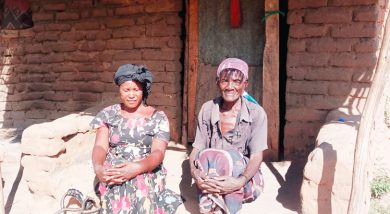Chief fights malnutrition
In 2010, Ainess Benard, 45, became the first woman to be enthroned as Traditional Authority (TA) Mpunga in Chiradzulu District.
This makes the mother of four the most powerful chief in her rural territory.
The chief grew up being told that pregnant women and lactating mothers who eat eggs and meat risk giving birth to bald-headed crybabies.
She wants this ended for the well-being of every child and woman.
“As a leader, experience has taught me to serve and lead by example,” she says. “My people trust me because I do what I say instead of just telling them ‘do this’ or ‘don’t do that’. I make sure everyone lives happily and enjoys good health, including those who cannot speak or work for themselves.”

Going village to village
TA Mpunga has become a firm cultural warrior tackling myths and misconceptions fuelling malnutrition among pregnant women, lactating mothers and children aged below five.
She goes village to village alongside nutrition promoters to ensure children have a healthy start in life that guarantees their good health, mental growth, learning ability as well as better productivity and chances in life.
“We cannot talk about healthy lives without healthy diets, so it’s unfair that myths and misinformation denied children and women diversified diets containing eggs and meat,” the chief states.
TA Mpunga is among five nutrition champions in Chiradzulu where Afikepo project has been ramping up nutrition, crop diversification and sanitation since 2018. The project underway in 10 districts is supported by Unicef and its sister United Nations agency, the Food and Agriculture Organisation (FAO), with funding from the European Union.
“Before the rollout of Afikepo, we had many nutritional challenges, especially stunting. Many children were too small for their age because, to us, food was only nsima. We didn’t know the importance of diversified diets, skills to prepare nutritious meals from locally produced foods and the dangers of poor sanitation,” she explains.
Afikepo Project
TA Mpunga thanks Afikepo for training community-based volunteers who go door to door, sharing the importance of diversified diets from six food groups and sanitation. The nutrition promoters and cluster leaders also convene communal cooking demonstrations to teach women different ways to prepare nutritious meals.
“Thanks to the tireless volunteers, pregnant women now eat eggs without fear and food is no longer just nsima, which fills the stomach but offers less nutrients that they need to give birth to healthy babies,” explains the chief.
Instead of just relying on meals from rain-fed crops whose yields keep dwindling amid climate change, TA Mpunga’s community now grows vegetables all year-round in their backyards and neighbouring wetlands.
The chief knows that mindset change does not occur overnight, but gradually.
She states: “To combat the myths relayed from one generation to another, I tell village heads and village development committees to always remind people in their communities that it is time we challenged and modified harmful cultural beliefs.
“I personally meet resistant parents, especially fellow women, to discuss the benefits of eating diverse diets from six food groups.”
TA Mpunga also attends masanje, the community-based cooking demonstrations where she, among others, first got to taste fritters from ground soya beans as well as pigeon peas boiled together with meat and vegetables.
“I still attend the cooking demonstrations because I learn a lot, especially the different recipes from locally available foodstuffs that we once took for granted. When I go home, I put the lessons to good use so that my four-year-old grandson can grow well,” she says.
Chiradzulu had one of the highest malnutrition rates in the country where nearly one in three children is stunted, according to the Malawi Demographic and Health Survey of 2015.
Setting the tone
Health surveillance assistant Maxwell Matumbo says the numbers of moderately and severely malnourished children are dropping in Chief Mpunga’s territory.
The community health worker has worked in Mpunga’s territory for 13 years, conducting door-to-door visits and nutrition screening during under-five clinics.
He commends the chief for rallying fellow traditional leaders to safeguard the nutrition and well-being of every child.
Matumbo explains: “The hard-working chief uses every opportunity, including communal gatherings, funerals and area development committee meetings, to rally village heads and change agents to dial up correct nutrition messages.
“She has set the tone for all village heads and change is vivid. Malnutrition rates are falling, meaning that children are living healthy lives as myths that prevented them from eating a diversity of foods are disappearing.”
The community health worker says the chief and volunteers make healthcare workers’ jobs easier when it comes to sharing the correct nutrition and sanitation practices.
Mpunga is excited with the falling count of malnourished children in her area.
“The future looks good if we sustain the teamwork and community action that we have embraced under Afikepo, she says. “So, I urge all community leaders to jump to the front and lead by doing, not just talking in confronting malnutrition gaps that deny vulnerable groups diverse diets.”





